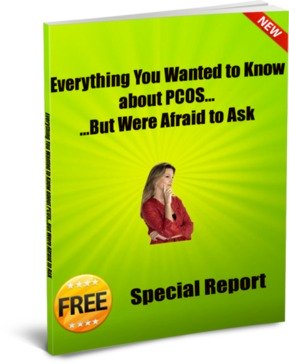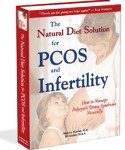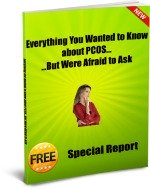PCOS Review Newsletter #22
1) Clomiphene May Increase Uterine Cancer Risk
2) Metformin vs. Lifestyle Improvement
1) Clomiphene May Increase Uterine Cancer Risk
Judging by the messages we receive from you, many women with PCOS and infertility are using Clomid, with little concern about its possible long-term consequences.
The use of clomiphene citrate (Clomid, Serophene) to induce ovulation in women with fertility problems appears to be associated with an increased risk of uterine cancer, according to a report published this month.
Researchers from the National Cancer Institute investigated the possible link between ovulation induction using clomiphene citrate and uterine cancer risk in 8,431 women who were evaluated for infertility between 1965 and 1988.
These infertile women were found to have a 56% higher risk of developing uterine cancer than women in the general population. The increased uterine cancer risk was more pronounced (a more than twofold increase) among women who had been exposed to clomiphene. After adjusting the data for other risk factors, clomiphene use remained an independent predictor of uterine cancer.
The risk was increased as the dose of clomiphene increased. Risk was further elevated for women who were followed for 20 years or longer. These women had an increased risk that was two and one half times higher than women who never used clomiphene. The highest increased risk -- more than 12-times higher -- occurred in women who were obese and had never been pregnant when they entered the study.
An earlier study of a similar population of women showed that clomiphene was associated with a slight but statistically insignificant increase in breast cancer. However, there was a stronger association between clomiphene and invasive types of breast cancers.
Clomiphene is a powerful, synthetic estrogen-like drug that rather drastically alters your hormonal patterns by interfering with estrogen receptor function. This "anti-estrogen" action makes your body think it doesn't have enough estrogen, which stimulates production of hormones that may cause you to ovulate.
However, the manipulation of your hormones with synthetic drugs almost always has side effects, some of which are not well known. Clomiphene may reduce the quality of the lining of your uterus and thus make implantation of an embryo less likely. It may reduce cervical mucus, which impedes movement of sperm. The effect of clomiphene on your eggs or embryo is not well understood, although some investigators are concerned.
You have probably been told that clomiphene is "safe". Recent evidence suggests it is not absolutely safe. It may be "relatively" safe. What we know for sure is that taking clomiphene is less safe than not taking it at all. Moreover, taking clomiphene does not guarantee that you will ovulate and become pregnant. Weigh the benefits and risks of Clomid carefully.
We recommend that you improve your general health (especially your diet) and explore natural methods of improving your fertility before you resort to clomiphene.
Sources:
Althuis, MD et al, Uterine cancer after use of clomiphene citrate
to induce ovulation. Am J Epidemiol. 2005 Apr 1;161(7):607-15.
Brinton, LA et al, Breast cancer risk associated with
ovulation-stimulating drugs. Hum Reprod, 2004, 19(9):2005-13
2) Metformin vs. Lifestyle Improvement
Polycystic Ovary Syndrome (PCOS) and Metabolic Syndrome are two chronic disorders that have a great deal in common. Metabolic syndrome is characterized by increased abdominal fat, blood pressure, cholesterol, triglycerides, and blood sugar. All of these symptoms are also commonly found in women with PCOS. Individuals with either metabolic syndrome or polycystic ovarian syndrome are predisposed to develop diabetes and heart disease. Therefore, research about metabolic syndrome is relevant to most women with polycystic ovary syndrome.
The University of Pittsburgh has just reported that lifestyle changes are more effective than drug treatment in preventing metabolic syndrome. In this study, investigators followed 3,234 people who had not yet developed outright diabetes but who had high blood glucose levels.
The individuals were put into one of three groups: those taking the drug metformin (Glucophage), or taking an inactive placebo pill, or undertaking lifestyle modification designed to achieve and maintain a 7% weight loss and 150 minutes of exercise per week.
53% of the participants had metabolic syndrome when they enrolled in the study. After 3 years, the rate of metabolic syndrome decreased from 51% to 43% in the Lifestyle group. However, it increased from 55% to 61% in the Placebo group, and from 54% to 55% in the Metformin group.
This study suggests that a healthier diet, regular exercise and losing weight is more effective than taking Glucophage for reducing metabolic syndrome symptoms and the risk of diabetes. Moreover, in contrast to metformin, a healthy lifestyle has no side effects -- and it is less expensive.
Since metabolic syndrome and polycystic ovary syndrome have so much in common, we suspect the results of this study may also be valid for PCOS. If so, a healthy diet, regular exercise, stress management and weight loss will do more to help you than taking a drug.
Source: Orchard TJ et al, The effect of metformin and intensive lifestyle intervention on the metabolic syndrome: the Diabetes Prevention Program randomized trial. Ann Intern Med. 2005 Apr 19;142(8):611-9
3) PCOS Success Stories
In case you haven't noticed, we've posted on our site the stories of women who've had success in dealing with PCOS or infertility. We've also included the accounts of some women who want to be successful but haven't yet found the best method for reducing PCOS and infertility problems.
You may find it helpful to visit this web page and discover what
other women are doing to help themselves. It's also important to
realize that you're not alone and that other women are on the
same path as you are.
Women Share
Their PCOS and Infertility Success Stories
This isn't a forum where people can directly communicate back and forth. A forum is on our "wish list" but right now we don't have the womanpower and financial resources to make it happen. However, we will be posting new stories frequently.
PCOS Health Review
This free newsletter gives you original and immediately usable information to help you deal with PCOS.
Get the latest research, tips for improving your health, answers to questions, success stories, and more!
Your e-mail address is totally secure. We will never misuse your information.
Enter Your Email Above to Subscribe Today
and Get Your Questions Answered in this Free Special Report!





